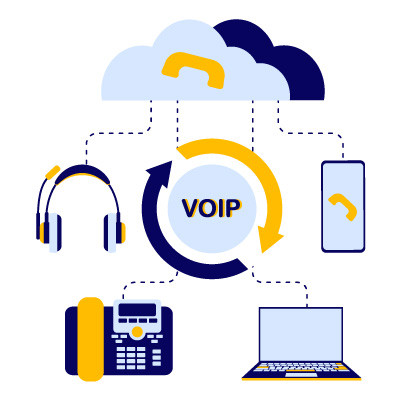A business telephone system has picked up some pretty costly requirements over the past several years. Not only does your business need to have a clear and concise calling system internally, it needs to incorporate video conferencing and remote communications. This can get pretty costly if you don’t have the right technology in place. That right technology is VoIP and it can save your business money and present options that allow your employees seamless communication capabilities.
What is VoIP?
VoIP is an acronym for Voice over Internet Protocol, which is the basis of the technology. Instead of using traditional phone lines to carry communications, these connections are completed through the Internet. Most businesses have surplus bandwidth that just goes to waste. By shifting your communications to VoIP, you remove the need for traditional telephone service and conduct business communications over the Internet. It provides some serious benefits, including:
Cost Effectiveness
One of VoIP's primary advantages is its remarkable cost efficiency. Traditional telephone systems often have hefty installation, maintenance, and long-distance calling charges. In contrast, VoIP leverages the power of the internet to transmit voice data, eliminating the need for a separate infrastructure for voice and data. Businesses can significantly reduce their communication expenses by adopting VoIP, especially for international or long-distance calls. The cost savings extend beyond just call charges, as the simplified infrastructure requires less maintenance, further reducing costs.
Flexibility and Scalability
VoIP offers unparalleled flexibility and scalability, adapting seamlessly to the evolving needs of businesses. Unlike traditional phone systems that are often bound by physical limitations, VoIP operates over the Internet, allowing users to make and receive calls from any location with an Internet connection. This is particularly beneficial for remote workers.
VoIP systems are highly scalable, making it easy for businesses to expand or reduce user accounts without the hassle of rewiring or reconfiguring a traditional phone system. With this, VoIP provides the agility needed to adjust communication infrastructure on the fly.
Innovative Features
VoIP goes beyond basic voice communication, offering a plethora of advanced features that enhance productivity and collaboration. Features like voicemail to email transcription, call forwarding, auto-attendants, and video conferencing contribute to a more dynamic and efficient communication environment. VoIP integrates with other business applications and tools, fostering a unified communication ecosystem.
For example, integration with customer relationship management (CRM) systems allows businesses to streamline workflows and provide better customer service by accessing relevant customer information during calls. This integration saves employees a lot of time and improves the customer experience.
Enhanced Mobility
Many workers now work remotely, requiring communication solutions that can travel with them. VoIP empowers users with enhanced mobility, allowing them to make and receive calls using their business phone number from various devices, including smartphones, laptops, and tablets. This flexibility is especially valuable for remote workers, traveling professionals, and businesses with geographically dispersed teams.
VoIP's mobility features improve accessibility and responsiveness, ensuring that important calls are never missed, irrespective of the user's physical location. This adaptability aligns perfectly with the evolving nature of work and helps businesses maintain a competitive edge.
If you would like to learn more about VoIP's benefits and why it is the future of communications, call our consultants today at Coleman Technologies.




